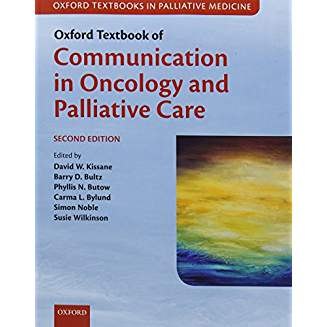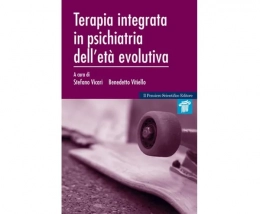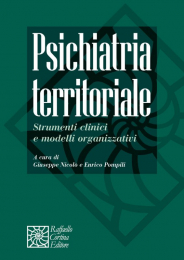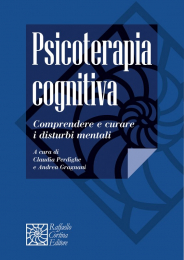Non ci sono recensioni
DA SCONTARE
Now in paperback, the Oxford Textbook of Communication in Oncology and Palliative Care integrates clinical wisdom with empirical findings. Written by an international team of authors, it draws upon the history of communication science, providing the reader with a comprehensive curriculum for applied communication skills training.
An essential resource, the Oxford Textbook of Communication in Oncology and Palliative Care is filled with tips and strategies for effective communication in difficult and challenging scenarios. In focusing on cancer and the end-of-life, it deals with the existential and spiritual challenges found across all of medicine, providing deep insights into what is at stake and how clinicians might optimally respond. This authoritative and wide-ranging book provides clinicians with state-of-the-art and evidence-based guidelines to achieve effective, patient-centred communication in the clinical settings of oncology and palliative care.
This edition includes sections on the curriculum for nurses, the core curriculum, and an introductory section on communication science. The chapters embrace specialty issues across the clinical disciplines, from enrolling in clinical trials, working in teams, and discussing genetic risk, to talking about sexuality, infertility, and intercultural issues. An educational perspective is also provided, with chapters covering communication skills training, how to evaluate courses, and international models of training.
1: The history of communications skills knowledge and training, Mack Lipkin Jr.
2: Journeys to the centre of empathy: the authentic core of communication skills, Renee Lim and Stewart Dunn
3: Models of communication skills training and their practical implications, Richard Brown, Alexander Wuensch, and Carma L. Bylund
4: Shared decision-making, decision-aids and the role of values in treatment decision-making, Amiram Gafni and Cathy Charles
5: The ethics of communication in cancer and palliative care, Laura A. Siminoff and Maria D. Thomson
6: Gender, power, and nonverbal communication, Marianne Schmid Mast, Valérie Carrard, and Judith A. Hall
7: Medical student training in communication skills, Gregory Makoul, Joshua Hauser, and Henry Schneiderman
8: Training patients to reach their communication goals: a concordance perspective, Thomas A. D Agostino, Carma L. Bylund, an dBetty Chewning
9: Cancer patients use of the internet for cancer information and support, Emily B. Peterson, Megan Shen, Jennifer Gueguen Weber, and Carma Bylund
10: Audio-recording cancer consultations for patients and their families putting evidence into practice, Thomas F Hack, Kinta Beaver, and Penelope Schofield
11: Learner-centered communication training, Suzanne M. Kurtz and Lara J. Cooke
12: Breaking bad news, Walter F. Baile and Patricia A. Parker
13: Discussing prognosis and communicating risk, Phyllis N. Butow, Martin H. N. Tattersall, and Martin Stockler
14: Achieving shared treatment decisions, Martin H. N. Tattersall and David W. Kissane
15: Responding to difficult emotions, Jennifer Philip and David W. Kissane
16: Denial and communication, Linda Sheahan and David W. Kissane
17: Communicating with relatives in cancer care, Isabelle Merckaert, Yves Libert, Aurore Liénard, and Darius Razavi
18: Conducting a family meeting, David W. Kissane and Courtney Hempton
19: Communication about coping as a survivor, Linda E. Carlson , Janine Giese-Davis, and Barry D. Bultz
20: Dealing with cancer recurrence, Lidia Schapira and Lauren Goldstein
21: Introducing or transitioning patients to palliative care, Katalin Urban, Josephine M. Clayton, and David W. Kissane
22: Talking about dying: end-of-life communication training, Tomer T. Levin and Alison Wiesenthal
23: Communication skills education and training in pre-registration BSc Nursing, Deborah Ann Lewis , Marie O Boyle-Duggan, and Sue Poultney
24: Sage & Thyme, Michael Connolly
25: Implementation of advanced communication skills training for senior health care professionals in Northern Ireland: the challenges and rewards, Anne Finn, Emma King, and Susie Wilkinson
26: Training facilitators to deliver an advanced communication course for senior health care professional in cancer and palliative care., Susie Wilkinson and Anita Roberts
27: Communication in the context of cancer as a chronic disease, Patsy Yates
28: Advancing family communication skills in oncology nursing, Talia Zaider, Shira Hichenberg, and Lauren Latella
29: Ambulatory care nurses responding to depression, Anthony De La Cruz, Richard Brown, and Steve Passik
30: The last hours and days of life, Anita Roberts
31: Elearning as a medium for communication skills training, Hannah Waterhouse, Melanie D.S. Burton , and Julia Neal
32: Enrolment in clinical trials, Richard Brown and Terrance Albrecht
33: Working as a multidisciplinary team, Jane Turner
34: Communicating genetic risk, Clara Gaff, Louise Keogh. and Elizabeth Lobb
35: Supporting patients considering reconstructive surgery, Diana Harcourt and Alex Clarke
36: Discussing unproven therapies, Penelope Schofield and Michael Jefford
37: Promoting treatment adherence, Kelly B Haskard-Zolnierek , Tricia A Miller
38: Communication strategies and skills for optimum pain control, Melanie Lovell and Frances Boyle
39: Discussing adverse outcomes with patients, Andy S..L. Tan and Thomas H. Gallagher
40: A health equity care model for improving communication and patient-centered care: a focus on oncology care and diversity, Kimlin Tam Ashing, Noe R. Chavez, and Marshalee George
41: Challenges in communicating with ethnically diverse populations: the role of health literacy, Bejoy C. Thomas and Rebecca L. Malhi
42: Communicating about infertility risks, Zeev Rosberger, Barry D. Bultz, Sylvie Aubin , and Peter Chan
43: Communicating about sexuality in cancer care, John W. Robinson, Joshua J. Lounsberry, and Lauren M. Walker
44: Screening for distress: a communication tool that highlights patient concerns and facilitates psychosocial program development, Barry D. Bultz, Paul B. Jacobsen, and Matthew Loscalzo
45: Social work support in crisis, Carrie Lethborg and Grace H. Christ
46: Communication in cancer radiology, Kimberly Feigin and Donna D Alessio
47: Communication in surgical oncology, Amanda Tristram
48: Communication in non-surgical oncology, Lai Cheng Yew and E Jane Maher
49: Palliative medicine: communication to promote life near the end of life, Nikki Pease
50: Communication issues in pastoral care and chaplaincy, Peter Speck and Christopher Herbert
51: Communication in oncology pharmacy: the challenge of treatment adherence, Bethan Tranter
52: Communication challenges with the elderly, Ronald D. Adelman, Michele G. Greene, and Milagros D. Silva
53: Communicating with children when a parent is dying, Cynthia W. Moore and Paula K. Rauch
54: Facilitating skills practice in communication role play sessions: essential elements and training facilitators, Ruth Manna, Carma L Bylund, Richard F. Brown, Barbara Lubrano di Ciccone, and Lyuba Konopasek
55: The role of the actor in medical education, Paul Heinrich
56: The Oncotalk/Vitaltalk model, Robert M Arnold, Anthony L Back, Walter F Baile, Kelly Fryer-Edwards, and James A Tulsky
57: The Swiss model, Frederic Stiefel, Juerg Bernhard, Gabriella Bianchi, Lilo Dietrich, Christoph Huerny, Alexander Kiss, Brigitta Wössmer, and Céline Bourquin
58: The United Kingdom general practitioner and palliative care model, Simon Noble, Nicola Pease
59: The Belgian experience in communication skills training, Isabelle Merckaert, Yves Libert, and Darius Razavi
60: EU policy initiatives and communication, Luigi Grassi and Lucia Travado
61: Communication skills training in Arab countries: opportunities and challenges, the Qatar experience, Carma L. Bylund, Stephen Scott, and Khalid Alyafei
62: Evaluating communication skills training courses, Lyuba Konopasek, Marcy Rosenbaum, John Encandela, and Kathy Cole-Kelly
63: Qualitative approaches to clinician patient communication, Felicia Roberts
64: Issues in coding cancer consultations: interaction analysis systems, Phyllis Butow
65: The Roter interaction analysis system (rias): applicability within the context of cancer and palliative care, Debra L. Roter, Sarina R. Isenberg, and Lauren M. Czaplicki




